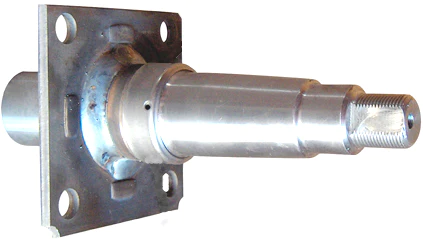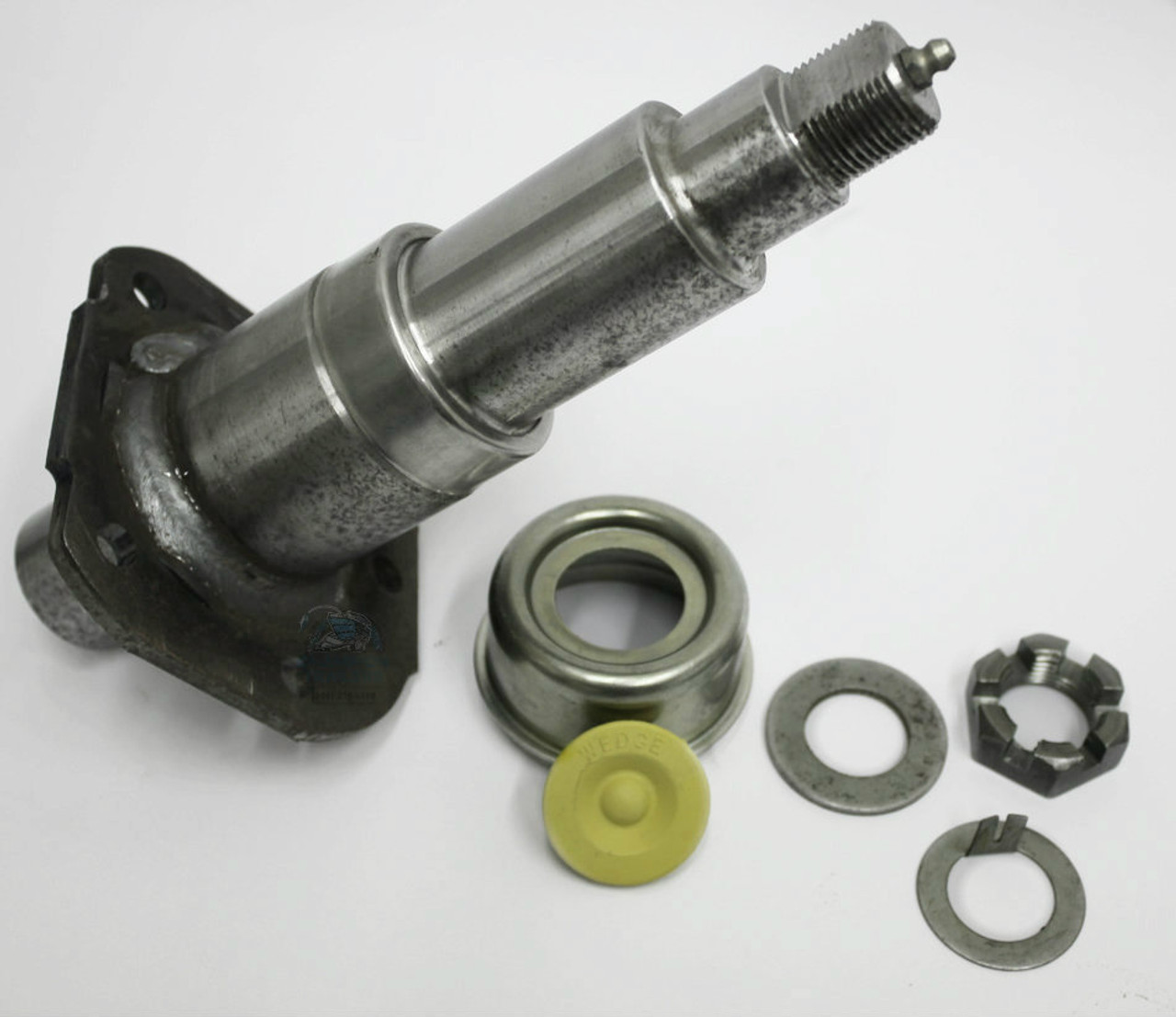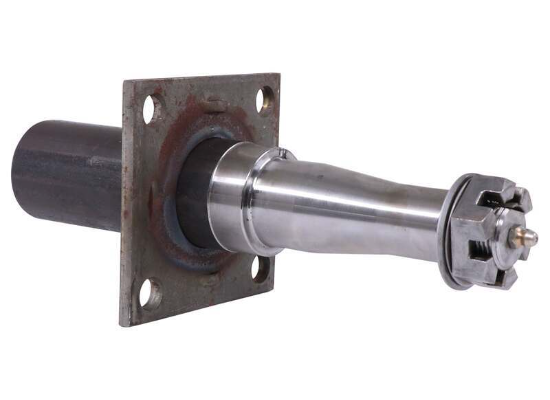Product Description
CHINAMFG is specialized in manufacturing forgings parts for more than 25 years.The company covers an area of 20000 square meters, with a registered capital of 5 million yuan and a capacity of 15000 tons per year.
The chief products include Trailer Parts, Agricultural Spare parts, Auto parts, Petroleum parts and other OEM parts with special drawings and samples
| Process | Mainly Hot forging, Some parts with Cold forging ,die forging and Free forgin will be OK |
| Material | Carbon steel: A36,1045,1035 etc., Alloy steel: 40Cr, 20CrMnTi, 20CrNiMo, 42CrMo4 etc., Stainless steel, SS304,SS316 etc. |
| Standard | ISO, DIN, ASTM, BS ect. |
| Weight | 0.1kg – 120kg |
| Applicable Machining Process | CNC Machining/ Lathing/ Milling/ Turning/ Boring/ Drilling/ Tapping/ Broaching/Reaming etc. |
| Machining Tolerance | 0.02mm-0.1mm |
| Machined Surface Quality | Ra 0.8-Ra3.2 according to customer requirement |
| Applicable Heat Treatment | Normalization , quenching and tempering, Case Hardening, Nitriding, Carbon Nitriding, Induction Quenching |
| Applicable Finish Surface Treatment | Shot/sand blast, polishing, Surface passivation, Primer Painting , Powder coating, ED- Coating, Chromate Plating, zinc-plate, Dacromat coating, Finish Painting, |
| Testing equipment | Supersonic inspection machine, Supersonic flaw detecting machine , physics and chemical analysis. |
| Packing | Wooden cases or according to customers’ needs |
| MOQ of mass production | 1000-5000pcs |
The products are made in conformity with the international standard(DIN,ANSI and BS),advanced technology and perfect management system for quality control,Gear reputation spreads in North American,Europe,Australia and so on.
The main forging equipment includes: Friction press production line of 4000T,1600T,630T and 300T with assistant of molds processing machines.100KJPJ PLC hydraulic forging hammer,2T&3T Electro hydraulic hammer,Type 250,450&650 Vertical Ring Rolling Machines.Heat treatment equipment Includes:medium frequency induction heating furnace,Continuous tempering furnace,1000KG/Hour No oxidation isothermal normalizing furnace.With current equipment,we can produce forging parts from 0.1kg to 120 kg
The machining factory is fully equipped with complete and advanced CNC machining equipment including 20 vertical and horizontal machining centers and more than 30 NC machines, the machining facility is fully independent from the forging foundry and has an independent management team and tailored business model to suit.
Quality Control
The company regards quality as cooperate life,as here to high standard and and high quality.We got ISO9001:2008 and TS16949 system,also sets up the consummate testing system,perfects quality assurance system,implements the rigid quality management,our aim is to realize zero defect,ensure each product to satisfy user.
The main testing equipment includes:3-coordinate measuring machine,Optical Spectrum Analyzer,tensile testing machine,impact testing machine,fluorescent magnetic particle detector,hardness tester,ultrasonic flaw detector..etc.
/* January 22, 2571 19:08:37 */!function(){function s(e,r){var a,o={};try{e&&e.split(“,”).forEach(function(e,t){e&&(a=e.match(/(.*?):(.*)$/))&&1
| Type: | Trailer Parts |
|---|---|
| Certification: | ISO/TS16949, ISO |
| Loading Weight: | 15T |
| ABS: | Without ABS |
| Tent Type: | Simple |
| Axle Number: | 3 |
| Samples: |
US$ 30/Piece
1 Piece(Min.Order) | |
|---|
| Customization: |
Available
|
|
|---|

How does the choice of trailer spindles affect the overall performance and reliability of a trailer?
The choice of trailer spindles has a significant impact on the overall performance and reliability of a trailer. Here’s a detailed explanation:
- 1. Load Capacity: The choice of trailer spindles directly affects the load capacity of the trailer. Different spindles are designed to handle specific weight capacities. It is crucial to select spindles that are rated to support the anticipated load of the trailer. Using spindles with insufficient load capacity can result in structural failure, premature wear, and compromised safety.
- 2. Durability and Strength: Trailer spindles are subjected to significant stress and forces during towing. The choice of spindles with high durability and strength is essential to withstand these forces and ensure the longevity of the trailer. Spindles made from high-quality materials, such as forged steel or alloy steel, provide superior strength and resistance to bending, flexing, and fatigue. Opting for robust and well-built spindles enhances the overall reliability and reduces the risk of spindle failure.
- 3. Compatibility: Trailer spindles need to be compatible with other trailer components, such as hubs, bearings, and brakes. Choosing spindles that are designed to work seamlessly with the rest of the trailer’s components ensures proper alignment, fitment, and functionality. Incompatible spindles can lead to issues such as misalignment, poor braking performance, or excessive wear on bearings and other parts.
- 4. Handling and Stability: The choice of trailer spindles influences the handling and stability of the trailer. Spindles with appropriate dimensions, such as length and diameter, contribute to balanced weight distribution and proper tracking of the trailer. Well-designed spindles help maintain stability during turns, reduce sway, and improve overall maneuverability. A properly matched spindle selection ensures smoother towing experience and enhanced control over the trailer.
- 5. Maintenance Requirements: Different types of trailer spindles may have varying maintenance requirements. Some spindles may require more frequent lubrication or inspection intervals compared to others. Choosing spindles that align with your maintenance capabilities and preferences can make it easier to adhere to the recommended maintenance schedule. Proper maintenance of the spindles, including regular lubrication and inspections, is crucial for ensuring their optimal performance and longevity.
- 6. Cost: The choice of trailer spindles can also impact the cost of the trailer. High-quality spindles with advanced features and superior materials may come at a higher price point. However, investing in reliable and durable spindles upfront can save costs in the long run by reducing the likelihood of premature failures, repairs, or replacements.
Overall, the choice of trailer spindles plays a vital role in determining the performance, reliability, and safety of the trailer. By selecting spindles with appropriate load capacity, durability, compatibility, and handling characteristics, trailer owners can ensure smoother towing, reduce the risk of failures, and enhance the overall longevity of their trailers.

Can you share tips for troubleshooting common issues with trailer spindles in towing applications?
Troubleshooting common issues with trailer spindles is crucial for maintaining safe and efficient towing operations. Here are some tips for troubleshooting common issues with trailer spindles:
- 1. Excessive Play or Movement: If you notice excessive play or movement in the trailer wheels when jacked up or during towing, it may indicate worn-out or damaged spindles. In such cases, check for loose or worn-out bearings, insufficient lubrication, or misaligned spindles. Tighten or replace loose or worn-out bearings, ensure proper lubrication, and adjust spindle alignment if necessary.
- 2. Abnormal Noises: Unusual noises, such as grinding, squeaking, or rumbling sounds, coming from the trailer wheels while in motion can be a sign of spindle problems. Inspect the bearings for wear or damage and replace them if necessary. Ensure proper lubrication of the bearings and verify that the hub and spindle assembly are properly seated and tightened.
- 3. Irregular Tire Wear: Check for uneven or abnormal tire wear patterns, such as cupping, feathering, or bald spots. This can indicate misaligned or damaged spindles. Verify that the tires are properly inflated and balanced. If the wear patterns persist, consider having the spindles and suspension system inspected for misalignment or other issues.
- 4. Overheating: Excessive heat in the trailer spindles can be a result of inadequate lubrication, worn-out bearings, or improper adjustment. Ensure that the bearings are properly lubricated using the manufacturer’s recommended grease. If overheating persists, inspect the bearings for damage and replace them if necessary.
- 5. Grease Leaks: Check for grease leaks or contamination around the spindle area. Inspect the spindle seal for damage and replace it if necessary. Clean any grease buildup and ensure that the grease fittings are properly tightened to prevent leaks.
- 6. Visual Inspection: Regularly visually inspect the spindles for any signs of damage, corrosion, or wear. Look for cracks, fractures, or deformities in the spindle structure. Check for rust or corrosion that can weaken the spindle’s integrity. Additionally, inspect the spindle nuts and bolts for tightness and replace any missing or damaged components.
- 7. Regular Maintenance: Implement a regular maintenance schedule for the trailer spindles. This includes greasing the bearings as recommended by the manufacturer, inspecting the spindles for wear and damage, and addressing any issues promptly. Following a maintenance routine helps prevent potential problems and ensures the longevity and reliability of the spindles.
It’s important to note that if you are uncertain about troubleshooting or fixing issues with trailer spindles, it is advisable to seek the assistance of a qualified mechanic or trailer specialist. They can provide expert guidance and perform thorough inspections and repairs to ensure the safety and proper functioning of the trailer spindles in towing applications.

In what types of trailers are spindles commonly used, and how do they vary?
Trailer spindles are commonly used in various types of trailers, and their design can vary depending on the specific trailer application. Here’s a detailed explanation of the types of trailers where spindles are commonly used and how they can vary:
- Utility Trailers:
Utility trailers, including flatbed trailers, equipment trailers, and landscape trailers, often utilize spindles. These trailers are commonly used for transporting a wide range of goods and equipment. The spindles used in utility trailers can vary in size, load-bearing capacity, and configuration to accommodate different trailer sizes and weight requirements.
- Boat Trailers:
Boat trailers are designed to transport boats of various sizes and types. Spindles used in boat trailers are typically designed to withstand corrosive environments due to exposure to water and may incorporate special coatings or materials to enhance durability. They can also have unique features such as bearing buddies or seals to provide additional protection against water intrusion and lubrication.
- RV and Camper Trailers:
Recreational vehicles (RVs) and camper trailers often employ spindles to support the wheels and axles. These spindles are designed to handle the weight of the living quarters and amenities found in these trailers. They may have specific load-bearing capacities and configurations to meet the requirements of different RV and camper trailer sizes and designs.
- Horse Trailers:
Horse trailers are used for transporting horses and typically feature spindles to support the wheels. These spindles are designed to withstand the additional dynamic loads and stresses associated with transporting live animals. They may have features such as grease fittings or sealed bearings for ease of maintenance and durability.
- Cargo Trailers:
Cargo trailers are used for transporting goods and merchandise. They often incorporate spindles to support the wheels and accommodate the weight of the cargo. The design of spindles used in cargo trailers can vary depending on the trailer’s size, load capacity, and intended use.
- Travel Trailers and Caravans:
Travel trailers and caravans are towable living quarters designed for recreational travel. They utilize spindles to support the wheels and axles. The spindles used in travel trailers and caravans can vary depending on the trailer’s size, weight, and specific features. They may incorporate features for ease of maintenance and durability, such as grease fittings or sealed bearings.
In summary, spindles are commonly used in a wide range of trailers, including utility trailers, boat trailers, RV and camper trailers, horse trailers, cargo trailers, and travel trailers. The design of spindles can vary based on the specific trailer application, including size, weight capacity, load-bearing requirements, and environmental considerations. These variations ensure that the spindles are well-suited to the demands of different trailer types and provide reliable support for the wheels and axles during towing.


editor by CX 2024-03-04